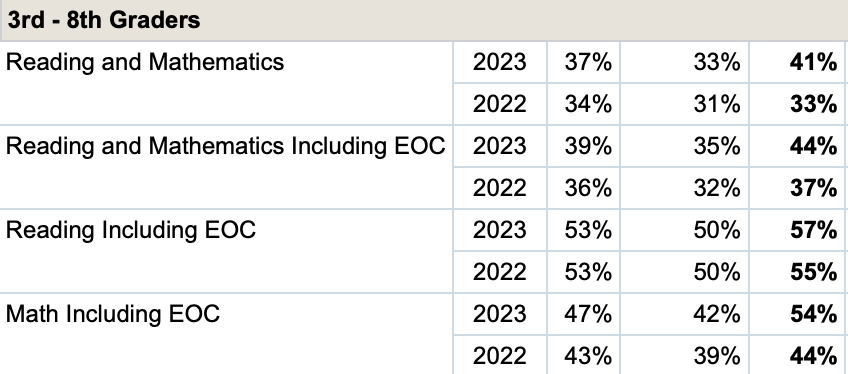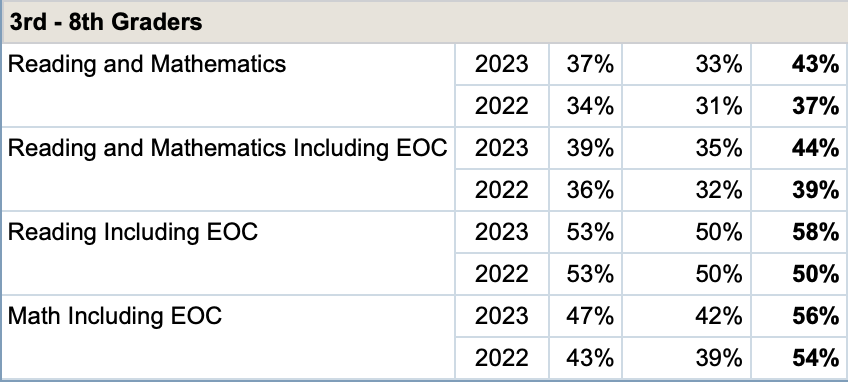Bell Co. School Superintendents: Does the Performance Match the Pay?
Tracking Taxpayers' Return on Investment

With the release of new Texas public school superintendent salary information, another measure becomes available for Bell County residents to assess their ROI (return on investment) when it comes to public school performance and the tax dollars spent, particularly dollars spent on executive leadership.
Articles of the past months have focused on seven Bell County area school districts (Academy, Belton, Copperas Cove, Killeen, Salado, Temple and Troy) and generated articles about school library content and school performances as well as the Bellstocracy in general – a cohort in which school superintendents figure prominently.
TEA Salary Findings
The Texas Education Agency has released its 2023-2024 Superintendent Salaries as of October 2023 report which details eye-opening data.
Texas Scorecard provides this overview:
Newly released Texas Education Agency data for the 2023-24 school year shows eight superintendents with salaries above $400,000 and another 81 receiving $300,000 or more.
Texas’ highest-paid school superintendent was again Cypress-Fairbanks ISD’s Mark Henry, who pulled down a base salary of $536,775 before retiring in December 2023.
Last school year, 77 superintendents received taxpayer-funded salaries above $300,000, with five making $400,000 or more.
During the 2021-22 school year, 60 superintendents scored salaries at or above $300,000.
So not only are the dollar amounts rising, but so are the number of superintendents receiving these inflated salaries.
It’s important to remember, as noted by Texas Public Policy Foundation, that the TEA “base pay amount does not include any of the generous benefits that are often provided, including: bonuses, allowances, healthcare, retirement, and more.”
TPPF Chief Communications Officer Brian Phillips also makes this interesting observation:
According to Yahoo Finance, the top 5% of all earners in Texas make $250,000 or more per year. That puts 172 superintendents into the elite category of the state’s most wealthy people. That’s saying something for a state that boasts the home of the oil and gas industry.
Superintendents at the seven Bell County area ISDs which we track came in as follows:
Note that Belton ISD Superintendent Matt Smith has moved to Arlington ISD and since been replaced by Dr. Malinda Golden at a salary of $236,860.
More TEA Salary Information
Meanwhile, TEA reports also offer teachers’ minimal 2023-2024 salaries as ranging from $33,660 to $54,540 based on years of experience. Teaching staff average base pay is listed as $62,463.
Under Administrative Staff, TEA lists average base pay as $94,609. This category includes district positions such as assistant superintendents and business managers as well as campus-level positions including principal and assistant principals.
Per Salary.com, Educational Administration job salaries in Texas range from $45,135 to $57,735 per year with the average salary coming in at $51,349. The site also notes “Educational Administration works in Texas will receive the highest salary in the United States, followed by California, New Jersey.” While these positions appear to represent a broad swath of administrative employees, the numbers and comparative ranking is noteworthy.
How the Private Sector Compares
Per ZipRecruiter.com, most Texas 2024 salaries range from $36,750 to $66,573 annually with the average coming in at $52,595. The site lists U.S. average pay as $75,500 with the majority of positions ranging from $63,500 to $91,500.
Income and Poverty in the United States: 2020, a report from the U.S. Census Bureau, offers median household income as $67,521 in 2020, a decrease of 2.9 percent from the 2019 median of $69,560. This was the first statistically significant decline in median household income since 2011.
Based on the 2022 American Community Survey, the Census Bureau lists Texas median household income as $72,284 opposed to the U.S. median of $74,755.
TEA’s salary information certainly doesn’t suggest education industry employees as being paid less than average taxpayers who fund these school districts. And as superintendent salaries have a striking similarity to our current economy – that is, one of rampant inflation – the next question: are these salaries worth it?
School Performance Revealed
Listed below are the statewide results as well as those of our seven Bell County area school districts.
2022-2023 STAAR Performance Rates by Enrolled Grade at Meets Grade Level or Above (State)
Note: EOC refers to End of Course Performance
2022-2023 STAAR Performance Rates by Enrolled Grade at Meets Grade Level or Above
ACADEMY ISD
Superintendent Salary: $175,631
Enrollment: 1,814
BELTON ISD
Superintendent Salary: $254,892
Enrollment: 13,808
COPPERAS COVE ISD
Superintendent Salary: $287,928
Enrollment: 7,959
KILLEEN ISD
Superintendent Salary: $325,000
Enrollment: 43,864
SALADO ISD
Superintendent Salary: $183,516
Enrollment: 2,346
TEMPLE ISD
Superintendent Salary: $280,000
Enrollment: 8,784
TROY ISD
Superintendent Salary: $155,000
Enrollment: 1,706
Click here to search other districts.
Return on Investment
A December article, New Report: Half or More Texas 3rd - 8th Graders Below Grade Level Standards, highlighted the above findings.
The article also asked how it might be received if the state – or a district – told parents or other interested parties that most students in its system failed to meet or exceed grade level standards. After all, the numbers are stunning, and not in a good way.
Asked differently, is the Texas public education industry providing taxpayers with a good return on their investment based on these performance levels and salaries?
The March primary seemed to somewhat answer that question as school choice was a major focus in 16 highly contested state House of Representatives races. In those races, insurgent candidates dominated establishment incumbents with six wins, another four headed into runoffs and only six of the 16 retaining their seats.
In addition to being the electoral battleground for the anti-school choice incumbents, the Republican primary ballot contained a proposition asking voters if “Texas parents and guardians should have the right to select schools, whether public or private, for their children, and the funding should follow the student.”
Statewide results found 79.53% saying yes to the measure. The same measure was on the 2022 Republican primary ballot and received 87.78% support. A 2012 Republican primary ballot similarly featured a proposition that “allowed parents the freedom to choose their child’s school.” Statewide, 84.6 percent voted in favor of that measure.
While school choice opponents celebrated the apparent decline of school choice support within just two years, this decrease is easily explainable when factoring the aggressive public education industry get-out-the-vote effort that included encouraging Democrats to vote in Texas’ open Republican primary system.
Where Do We Go from Here?
First and foremost, if you are in one of the districts with a May 28 primary runoff, vote! Past that, get ready for school choice to continue as a big issue here in Texas as the November general election approaches. And again, vote!
The Texas Legislature reconvenes in January 2025, and we have an opportunity to see real progress in the area of education freedom. This session should be used to demand greater transparency regarding public school operations and more instructional options/environments for Texas’ K-12 students.
While no first effort will be perfect, with the Texas public education industry’s current performance, change is desperately needed and long overdue.
Lou Ann Anderson worked in central Texas talk radio as both a host and producer and currently hosts Political Pursuits: The Podcast. Her tenure as Watchdog Wire–Texas editor involved covering state news and coordinating the site’s citizen journalist network. As a past Policy Analyst with Americans for Prosperity–Texas, Lou Ann wrote and spoke on a variety of issues including the growing issue of probate abuse in which wills, trusts, guardianships and powers of attorney are used to loot assets from intended heirs or beneficiaries.




















Yet another timely, much needed article. Great job!